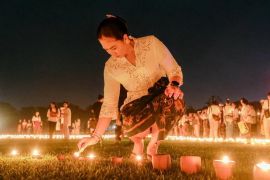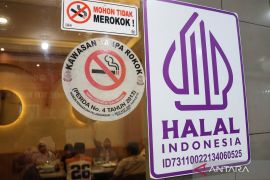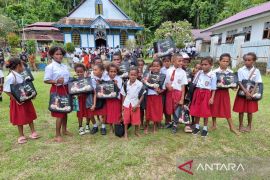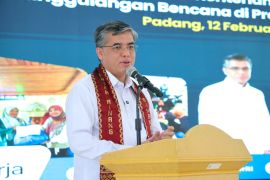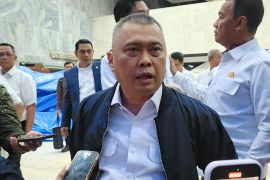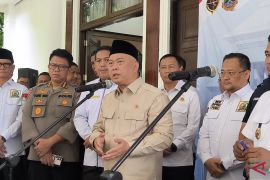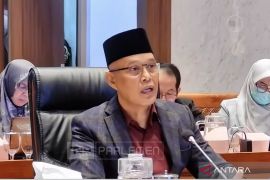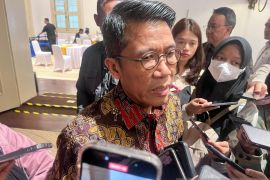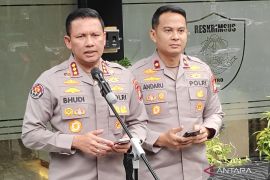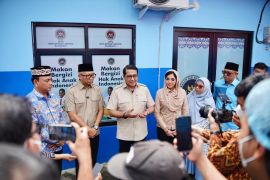As spoken by Sharif, the climate change is now increasingly threatens world life, such as the rise of sea level, temperature increase of sea surface, increasing storm activity, followed by harmful effects of ocean acidification which can be the biggest threat to the marine health. On that basis, Sharif considers that fast and precise act of mitigation and adaptation is needed in dealing with the reef ecosystem. "Perhaps the marine ecosystem is the first one to collapse without adaptation and mitigation act," he explained. Therefore the Blue Economy is considered to have potential in the new development paradigm by implementing new business development model that synergizes growth, development and environment. On that basis, the Government of Indonesia is determined to immediately adopt the concept of blue economy, given the growing trend of green economy concept implementation toward the blue economy. "Country such as Indonesia, the green economy is absolutely necessary, but as the world's largest archipelago nation, implementing green economy is not enough and need to be coupled with the concept of blue economy," as Sharif continued.
As the realization of Indonesia's commitment toward coastal and marine resources management, Government has set 3.5 million hectares of Sawu as marine conservation area. This marine conservation area is the largest in South East Asia and one of the largest of its kind in the world. MMAF is not only expand the conservation area, but also will emphasize the effectiveness of conservation management. By the mid of 2012, Indonesia has managed to establish marine conservation area of 15.35 million ha or 76.75 percent of the 20 million ha set target in 2020.
He said that the President of Indonesia, Susilo Bambang Yudhoyono, has previously stated his commitment that Blue Economy principles should be applied to achieve the sustainable growth based on equity. Even President Yudhoyono includes the blue economy principle in his document by carrying the title of, Indonesia Future in 2014 to identify and marine main strategy in 2014 to conserve and manage sustainable marine and fisheries resources. One of the way to achieve potential transformation for Blue Economy is through the conservation of biodiversity which is based on people. This approach focuses on "win-win" that accommodates the needs and aspirations through consultation including all stakeholders. However, it should be coupled with preservation of ecosystems that provide food, livelihoods and income to the community. In general, this approach can be developed by, among others, better understanding in appreciating marine ecosystem, synergize marine ecosystem with food security,economic and social development strategies, as well as the transition of economy, market, industry and society towards a more sustainable pattern of marine and coastal resources usage from time to time.
The principle of "Blue Economy" is considered able to provide benefits for Indonesia, which consists of over 70 percent of marine and coastal ecosystems. This principle can support the development of marine and fisheries resources sustainably. "Marine and fisheries resources is one thing that is very important to support Indonesia's economic growth which currently face the uncertainty of regional trends and future of the world," he said. As an illustration in 2010, Indonesia's population of 237 million and is estimated to reach 255 million by 2020. In addition Sharif estimates that the marine economic potential in Indonesia is approximately 1.2 trillion dollars per year, or it can be said to be equivalent to 10 times the country budget in 2012. Related to that according to Sharif, the blue economy should have encourage the sustainability of fish stocks, guarantee the ecosystems and environment health, and also encourage the utilization and management of marine and fisheries resources in an effective manner. One way to achieve this goal is through strengthening the institutional framework of governance and policies coordination at the national, regional and international levels.
In 2013 Indonesia will be the host of Asia Pacific Economic Cooperation (APEC) that focus on blue economy. Along with that, the blue economy principle will be taken as one of the main agenda that will be discussed by the APEC forum. The important point that will be carried out is that Indonesia is seriously carrying out the discussion of Blue Economy at bilateral and multilateral level. On the other hand, Blue Economy can encourage the sustainability of fish stocks, ensure ecosystem and the environment health, encourage the utilization and management of marine resources and fisheries effectively. One way to achieve this is by strengthening the institutional framework of marine governance and policy coordination at the level of national, regional and international.
In addition, besides discussing the Blue Economy the Government also presented the CTI in an effort to protect six million square kilometers of ocean and coastal through the Coral Triangle Initiatives (CTI), an area known as "the Amazon Sea" because of its biodiversity. The Coral Triangle becomes a meeting between the Indian and Pacific Oceans and becomes the place for 30 percent of the world's coral reefs and 75 percent of coral reefs widely known. In addition, there are more than three thousand species of fish in this region. "Cooperation with CTI-CFF is the only way we act consistently beyond our national borders, in maintaining the heritage of the world, "he explained. Regions 'Coral Triangle' is an underwater area which is still considered as virgin that extends from the island of Bali, in Indonesia, to the northern tip of Philippines, and the next point is in the Solomon Islands. To that end, the government has proposed CTI-CFF meeting at the upcoming APEC meeting which is scheduled held on November 25, 2013 in Bali, Indonesia.
For further information, please contact Indra Sakti, SE, MM, Head of Data,Statistic and Information Center, Ministry of Marine Affairs and Fisheries (Mobile: 0818159705)
Reporter: Adityawarman
Editor: PR Wire
Copyright © ANTARA 2012
